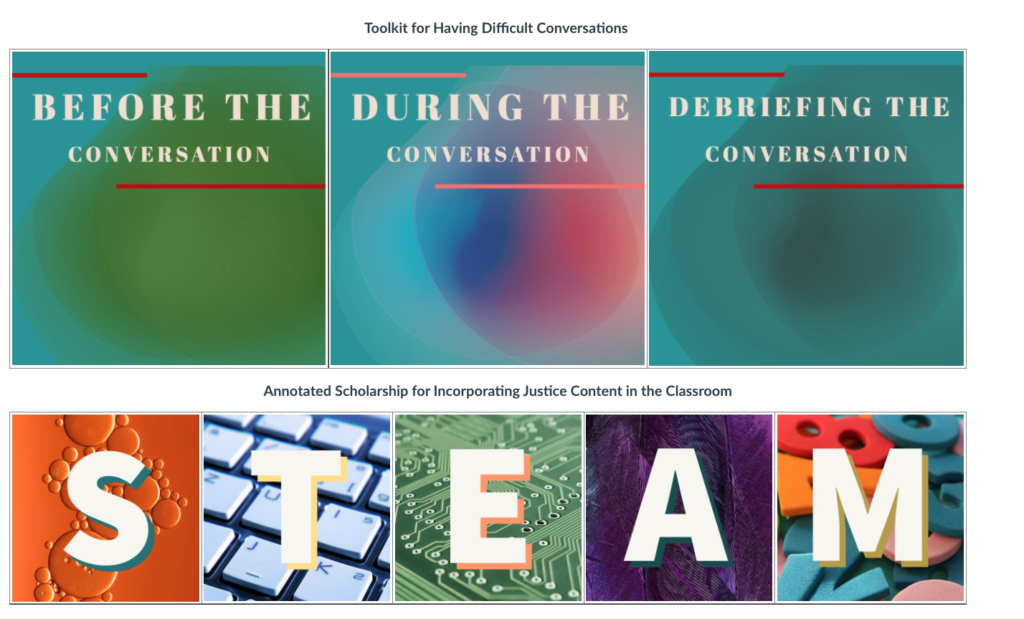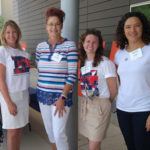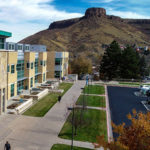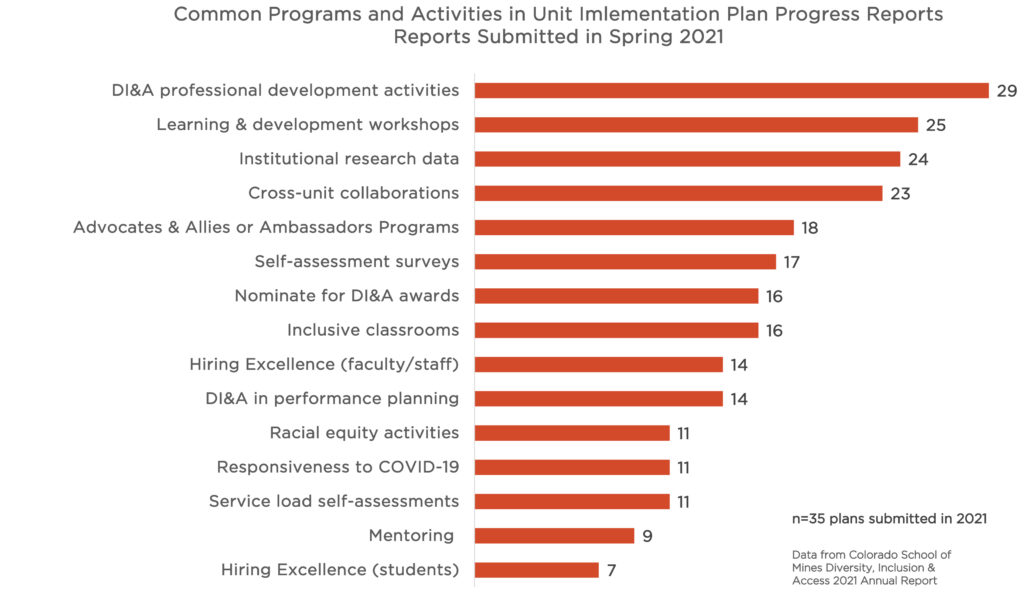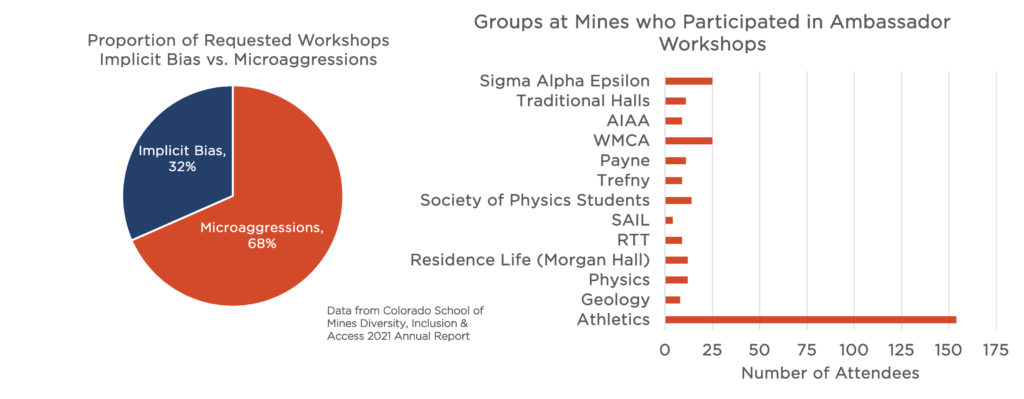One of the key tenets of DI&A work for Mines is this idea of Shared Responsibility. Shared Responsibility means the entire Mines community participates in and is accountable for advancing the DI&A Strategic Plan goals and recommendations. We support everyone at Mines – from individuals to departments – to find their own way to contribute to DI&A. To ensure a sense of shared responsibility, Mines established a “consultation service model” for DI&A. The Mines DI&A team leads many institutional efforts, but they also support and collaborate with campus units, teams and individuals on implementing the Strategic Plan.
Take a moment to review the “Ways Orediggers can Engage with DI&A” graphic below. It demonstrates the various opportunities Orediggers have to engage with DI&A at three degrees of learning stages: Foundational, Intermediate and Advanced. Foundational opportunities introduce DI&A concepts for beginners and the content provides a basic understanding of diversity, equity and inclusion. Intermediate opportunities are appropriate for those looking to build on and increase their knowledge of and skills for advancing diversity, equity and inclusion. Advanced opportunities are for community members who have been actively applying the foundational and intermediate concepts and are looking to deepen their expertise in diversity, equity and inclusion.
Four outstanding Orediggers have truly embodied this sense of shared responsibility by applying for and being awarded paid DI&A Fellowships. Each DI&A Fellow is leading a unique project that is accelerating Mines’ efforts toward reaching our Strategic Plan goals.
Ways Orediggers can engage with DI&A @ Mines



FOUNDATIONAL
Foundation level content provides an introductory or basic understanding of diversity, equity and inclusion.
| Try an Inclusion Icebreaker at your next meeting |
| Review Racial Equity Resources |
| Join a Mines Community Alliance (MCA) |
| Mentor or be a mentee through The Oredigger Network |
| Attend campus DI&A events |
| Participate in Mines climate surveys |
| Attend workshops at the Annual Celebration of DI&A |
INTERMEDIATE
Appropriate for those looking to build on and increase their knowledge of diversity, equity and inclusion.
| Join the Mines DI&A Council |
| Participate in Learning Communities |
| Submit a DI&A Award nomination |
| Promote hiring excellence |
| Incorporate DI&A best practices in candidate reviews & selection |
| Apply for a Community Grant |
| Join a department/campus unit diversity committee |
| Post to #OREDIGGERSFOREQUITY |
ADVANCED
For those who are looking to increase their expertise in diversity, equity and inclusion.
| Become an Ambassador, Advocate, Fellow or MCA Chair |
| Incorporate DI&A best practices in grants/proposals |
| Include DI&A in performance management |
| Use the Inclusive Classroom Checklist |
| Be an advisor to a student organization |
| Attend the Leadership Institute |
| Lead a K-12 outreach activity |
| Facilitate a workshop at the Annual Celebration of DI&A |
In September 2021, four DI&A Fellows were announced. The DI&A Fellows program recognizes highly accomplished and motivated faculty and staff for their exceptional DI&A leadership and service and provides support as they gain leadership experience and drive institutional change at Mines. Each Fellow drives a strategic initiative or program that furthers the vision and mission of Mines DI&A. The 2021-2022 Fellows are Dr. Derrick Hudson (HASS), Alex Leach (Office of Institutional Equity & Title IX), Dr. Shannon Mancus (HASS) and Dr. Justin Shaffer (CBE). To learn more about the Fellows and their projects, visit their page on the DI&A website. Below is an overview on the progress made in 2021 for each of their projects.
| Dr. Derrick Hudson, Associate Teaching Professor from the Department of Humanities, Arts and Social Science is leading an educational and service-learning course titled, “Dialogues on Agency, Race, Citizenship, Society (ARCS) and STEM.” This course partners selected Mines students with college students at the iSSACHAR Center for Urban Leadership, a non-profit organization Dr. Hudson helped to establish in the early 2000s. Students enroll in this program to gain leadership and academic exposure to important issues in politics, economics, culture and spirituality. This initiative falls under the DI&A Recruitment, Retention, Culture of Inclusion and Fostering Dialogue goals. This course, which is taught at the Issachar Center, seeks to create a sustainable location for partnering Mines and Issachar students in one of Denver’s historic African American neighborhoods, the Five Points and Whittier communities. It is hoped that over time, this course will begin to attract students of color who will aspire to view Mines as a “top-of-mind” goal to pursue STEM degrees and careers. Review the full description of Dr. Hudson’s efforts and outcomes so far in this document. | 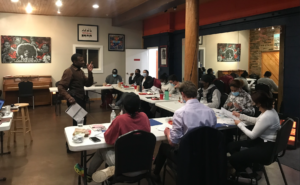 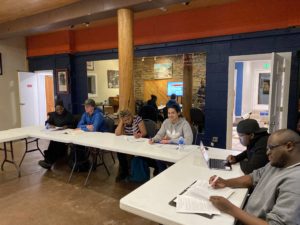 |
Alexandria Leach, Assistant Director, Case Management and Clery Compliance is leading a project to develop a toolkit for student leaders that will address issues of social justice, equity, and access. As the project developed over the past year, the issue that continues to come to the forefront of conversation is the need for leaders to be able to engage their peers in dialogue related to heavy topics, and so the project has come to center around the area of developing training and support for leaders to foster these spaces. Current work has included building connections and relationships with staff and student groups in Student Life to encourage cross-collaboration as efforts exist to increase space for dialogue. Future goals of the project include bringing in trainers to help students understand how to facilitate dialogue and eventually developing a Mines specific training that can be facilitated in-house for student leaders.
Dr. Shannon Mancus, Associate Teaching Professor from the Department of Humanities, Arts and Social Science is leading a project that aims to provide two critical DI&A-related resources to Mines faculty members. The first is a document that shows how DI&A content can be scaffolded throughout the curriculum; the second is a collection of resources for planning and facilitating difficult conversations in the classroom and beyond.
Throughout the semester, Dr. Mancus has communicated with faculty members across the CORE to assess what key terms and concepts that relate to DI&A are already being taught in our classes. She is using the data that she gathered to create a document that shows what concepts and terminology students are already learning in their foundational classes, so that professors in upper-level courses can build more intentionally on the knowledge that students already have about topics like bias and environmental justice.
This document will be housed on a Canvas page for faculty, along with myriad resources that will help faculty members have conversations around DI&A issues in their classrooms.
This project was borne out of conversations with colleagues about hesitancies surrounding having tough discussions in their classrooms. Many faculty members would like to introduce more DI&A content into their courses, but feel unsure or unpracticed when it comes to managing conversations around topics that can become contentious.
In 2021, Dr. Mancus researched and compiled effective methodologies for guard railing conversations around justice issues that can be implemented before, during, and after having difficult discussions in the classroom. By the end of spring 2022, faculty will be able to go to Canvas to build a toolbox of resources and choose effective tactics in a low-stakes, digital simulation of a classroom discussion.
The purpose of these resources, when taken together, will make it easier for professors to have more in-depth and structured conversations around DI&A that are productive and scaffolded across the curriculum.
Dr. Justin Shaffer, Associate Teaching Professor from the Department of Chemical and Biological Engineering is pursuing two Department of Education Upward Bound grants, which will provide college preparation and support to low income, first–generation high school students. In collaboration with Mines Admissions team, Lori Kester, Dale Gaubatz, and Louisa Duley, Mines has partnered with West High School in Denver, which has significant need for a program such as this. We are currently in discussions with other schools in the Denver and Jefferson County areas for interest in a second program. The Upward Bound RFP was due January 31, 2022. More information on Upward Bound can be found at this website.
Integrate contributions to DI&A
into individual and unit performance evaluations
Cultivate advocates and allies for professional development programming
Key Highlights and Opportunities
Highlights:
- Orediggers can engage in DI&A-related activities across Mines, from a foundational, intermediate or advanced level. The “Ways Orediggers can Engage” graphic provides avenues to deepen one’s skills.
- Mines DI&A funded four, $10,000 fellowships to Mines’ employees to do innovative and timely work for the institution.
- The Mines DI&A Ambassador program hosted around 25 workshops for over 300 participants to learn about implicit bias and how to intervene when a microaggression occurs.
Opportunities:
- Increase engagement in the Mines Advocates and Allies for Gender Equity program
- Develop strategies to institutionalize integrating DI&A into all Mines employees’ performance evaluations and measure outcomes
- Continue working with Faculty Senate on integrating DI&A into the Promotion and Tenure process for Academic Faculty
- Cultivate DI&A champions across all Mines community members to reinforce the shared services consultancy model
Academic departments and administrative units across campus are incorporating DI&A activities and goals into employees’ performance plans and evaluations. These activities and goals are driving participation in more campus events, which help to foster healthy discussions around sensitive DI&A topics and bolster a sense of inclusion in the community. Integrating DI&A into performance evaluations engages employees in shared responsibility. A template for DI&A-focused performance objectives can be downloaded for unit or employee use. Units take one of two approaches. They either publish a list of options an employee can undertake to achieve the DI&A objective in their evaluation, or they can consult with employees during the performance planning stage to craft DI&A objectives that are of interest to the individual. DI&A is not required for all employees, but if a unit elects to incorporate it, it should be implemented in a similar manner for all employees. The following provides an example of how this can be executed effectively.
CLASS implemented a second year of its CLASS DI&A Performance Plan strategy for 2021-22
CLASS (Campus Life and Student Success) represents 14 departments plus the Dean of Students office within Student Life and approximately 100 professional staff members.
All CLASS professional staff were expected to complete DI&A performance plans to be evaluated as part of 2021-22 performance evaluations. CLASS utilizes a structured DI&A performance plan which is intended to offer a balance between consistency among employees, alignment to Mines and CLASS DI&A strategic goals and an individualized plan. Nearly 100% of all CLASS employees completed the 2021-22 DI&A performance plan in fall 2021. Required categories of DI&A performance plans include Personal Work (Student Life’s Annual DI&A Training), Dialogue and Skill Building and an individualized action plan. In the Dialogue and Skill Building category, 83% indicated they planned to attend Mines DI&A Workshops or similar, 76% planned to participate in Real Talk or DEW Dialogue Sessions, 38% planned to participate in other department-identified options and 11% planned to develop and draft Real Talk weekly emails. Additionally, every CLASS employee identified an individualized action plan to improve equity, inclusion and/or access within their area of responsibility or institutional program or committee. DI&A performance plans will be evaluated during the 2021-22 performance evaluation.
DI&A Integrated into Performance Plans and Evaluations
The following units across campus have integrated DI&A into all employee’s performance management. Employees’ activities range from attending DI&A workshops to participating in self-directed learning or readings, to doing extra service or volunteer work. If you are internal to Mines you are able to access and review departmental progress reports.
| Budget and Financial Planning | Mining Engineering |
| Campus Living and Student Success | Petroleum Engineering |
| Computer Science | Public Safety |
| Engineering, Design and Society | Research and Technology Transfer |
| Geophysics | Trefny Innovative Instruction Center |
| Infrastructure and Operations | University Honors and Scholars Program |
| Information and Technology Solutions | Women in Science, Engineering and Mathematics Program |
| Military Science (ROTC) |
Shared responsibility means participation and accountability for DI&A efforts across the Mines community. One key aspect of this model is the development and dissemination of campus unit implementation plans. In 2019, each major unit at Mines, around 40 entities, developed and submitted a DI&A plan uniquely tailored to their needs and interests. These plans were reviewed by the DI&A team and expert advisors.
In the spring semester every year, each unit submits a progress report highlighting their accomplishments to-date on their implementation plans and provides updates and new commitments to their goals.
| This graph shows the most common programs and activities found in units’ implementation plan progress reports, which were submitted in spring 2021. Out of the 35 progress reports submitted, 29 of them indicated their unit engaged in some form of DI&A professional development for their employees or students. These citations are in addition to the 25 units who conducted learning and development workshops specifically on DI&A-related topics. Many more activities are listed, which demonstrate the breadth and depth commitments Orediggers have to DI&A. |
Click on graph image to view larger size |
There are two main programs that specifically work to cultivate advocates and allies for professional development programming at Mines. First is the “Advocates and Allies for Gender Equity” and the second is the “Mines DI&A Ambassador Program.”
Advocates and Allies are men at Mines who are committed to taking personal action in support of women and gender equity across campus. It was developed from the nationally recognized Advocates and Allies Program from North Dakota State University. Allies are men who complete a workshop hosted by Advocates and act to promote gender equity on campus. Advocates are allies with an established record in support of gender equity and dedicate time and effort to the Advocates and Allies program. There are five trained Advocates who facilitate workshops to foster more allies for gender equity at Mines. The workshop equips men with the knowledge, skills and strategies to effect positive personal, unit and organizational change. It also emphasizes men working together to address gender inequity, bystander intervention and maintaining accountability to women.
The Mines DI&A Ambassadors are a group of academic and administrative faculty, classified staff and undergraduate and graduate students who participate in a training program to learn more deeply about the impacts of implicit bias, microaggressions and other diversity, equity and inclusion topics. The Ambassadors program was launched in fall 2020 to meet the growing need for diversity and inclusion workshops at Mines. Each year, Orediggers submit applications and are selected and trained to become Ambassadors to lead workshops for campus.
The five advocates in 2021 include Kester Clark, Steve Kreidler, Dean Nieusma, Dustin Olsen and Christopher Coulston. The Allies program has been evolving since it was first launched in 2020. To engage the community, the Advocates run mini workshops to discuss gender equity with DI&A committees around campus, run co-ed full-length workshops and they run workshops for undergraduate students as well. In 2021, the Advocates ran four workshops:
- AMS DI&A committee (20 minute workshop): 10 participants; co-ed Oct 11, 2021
- Physics DI&A committee (20 minute workshop): 10 participants; co-ed Oct 12, 2021
- Computer Science DI&A committee (20 minute workshop): 10 participants; co-ed Nov 22, 2021
- Celebration of DI&A at Mines (60 minute workshop): 4 participants; January 28, 2021
